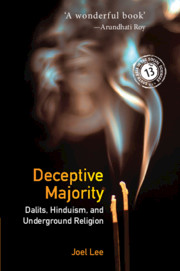4 - Trustee Majoritarianism: Gandhi and the Harijan Sevak Sangh
Published online by Cambridge University Press: 15 February 2021
Summary
Bhangi as Synecdoche
In a speech at a “Suppressed Classes Conference” in Ahmedabad in 1921, Mohandas Gandhi, after expressing regret at how few “untouchables” were in attendance, related the following vignette from his childhood in western India.
A scavenger named Uka, an untouchable, used to attend our house for cleaning latrines. Often I would ask my mother why I was wrong to touch him, why I was forbidden to touch him. If I accidentally touched Uka, I was asked to perform the ablutions, and though I naturally obeyed, it was not without smilingly protesting that untouchability was not sanctioned by religion, that it was impossible that it should be so. I was a very dutiful and obedient child and so far as it was consistent with respect for parents, I often had tussles with them on this matter. I told my mother that she was entirely wrong in considering physical contact with Uka as sinful. (Gandhi 1966a: 570)
The story of Uka supplies a fine example of Gandhi's carefully calibrated message to traditionalist Hindus: insisting that he was himself a sanātani Hindu and thus one of them, Gandhi denied the validity of religious sanction for untouchability and encouraged his co-religionists—not by denunciation but by patient persuasion—to follow his example in abandoning the practice. His portrayal of the “tussles” over untouchability as a relatively non-rancorous affair within a traditional family can be read as further support for the argument of Nishikant Kolge and others that Gandhi's approach to reforming caste was a strategic gradualism, calculated not to alienate the orthodox Hindus whose cooperation he felt to be crucial, but rather to invite them to adopt more liberal ways (Brown 1990; Kolge 2017; Lelyveld 2011; Nanda 1985).
What, though, of Uka? The latrine cleaner, having provided the occasion for Gandhi's display of progressivism, vanishes from the narrative. One wonders what Uka may have thought about the debate over sin in the Gandhi household, or in what terms Uka understood his own relation to the religious community of the family whose toilets he cleaned. One might ask how Uka got his name.
- Type
- Chapter
- Information
- Deceptive MajorityDalits, Hinduism, and Underground Religion, pp. 121 - 162Publisher: Cambridge University PressPrint publication year: 2021
- 1
- Cited by

